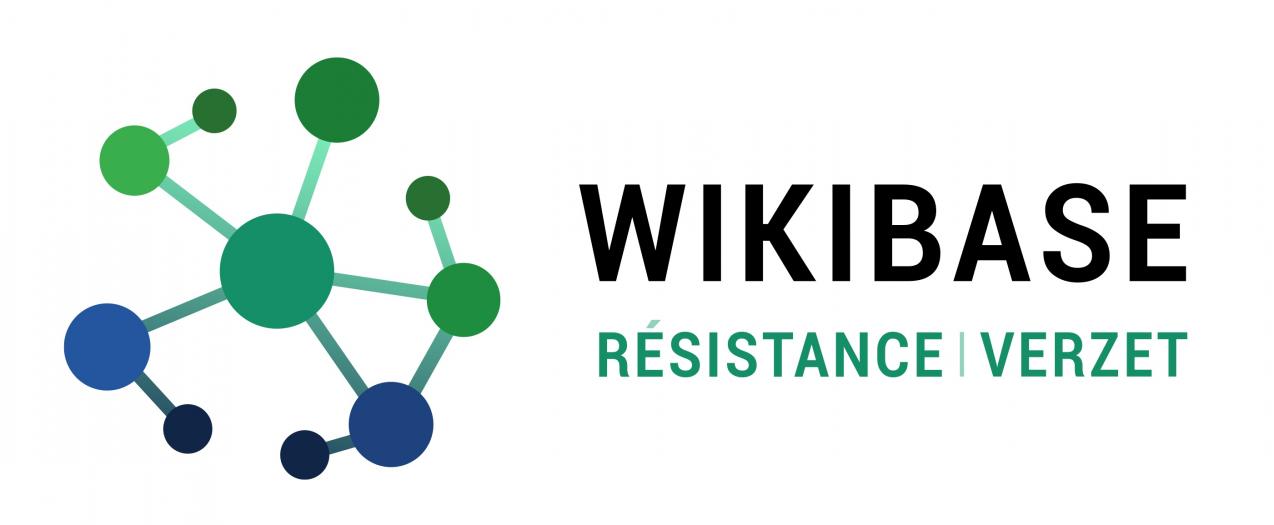Wikibase Resistance (2021 - )

In brief
Initiated by the Cegesoma in the spring of 2021, the Wikibase Resistance project aims to provide a research tool on people who were involved in resistance activities in Belgium during World War II. Led by Fabrice Maerten, Anne Chardonnens, and a team of over 15 people with varied expertise, this long-term project is intended to collect and publish information from forms and personal files kept at the CegeSoma and other repositories of the State Archives. Hosting structured, multilingual, human- and machine-readable data, this knowledge base will allow searching among several hundred thousand descriptions of about more than 150,000 resistance fighters, starting from a name, a date of birth, a place of residence or the name of a resistance movement or network.
The online platform was launched on 21 October 2024.
Link to the Resistance in Belgium online platform:
https://resistanceinbelgium.be
Objectives
The objectives of the project are multiple: on the one hand, the WikiBase Resistance aims to centralize the data dispersed among different physical repositories and digital files, in order to improve access to the CegeSoma collections and other State Archives repositories, as well as their visibility. On the other hand, this optimization allows us to better take into account the requests of our public concerning individuals, while exploring new ways of querying data. Indeed, this pilot project is part of a larger context marked by the emergence of a new international standard for archival description Records in Contexts based on making data available in machine-readable formats.
Contents
The Wikibase Resistants knowledge base is based, as its name indicates, on the free software Wikibase, which ensures the functioning of the generalist knowledge base Wikidata.
It allows to store multilingual data in an accessible and easily reusable format, readable by machines. In this case: data about resistance fighters. At its creation, each Person entity receives a unique identifier, a description, and semantic fields used to endow the entity with properties. To allow its identification, each person is described using a minimum of eight properties:
- Last name
- First name(s)
- Date of birth
- Residence (in Belgium or abroad)
- Resistance movement and/or network to which the person belonged
- Reference of the associated archive
- Status of national recognition obtained or not
- Inventory number
- In some cases, the data will be enriched with other types of information such as gender, language, nationality, place of birth, civil status, profession, a date of arrest, a date of liberation or death, etc.
Currently, the data encoding is focused on the forms and personal files contained in the archival funds kept by CegeSoma and Archives Service for War Victims. Namely, the funds (complete or partial) of :
a. Archives managed by CegeSoma:
- Affranchis
- Belgian Military Resistance Organization
- Group G
- Hotton group of the Secret Army
- Independence Front
- Insoumis
- Kempisch Legioen
- L100
- National Royalist Movement
- National Union of the Clandestine Press
- Nola
- State Security Service with regard to the agents of the Intelligence and Action Services
- Service D
- Witte Brigade
b. Archives managed by the Archives Service for War Victims:
- Status of resistance fighter through underground press activities
- Status of civil resistance
Later on, the project should also include the data contained in the files of all armed resistance fighters produced by the Office of the Resistance and kept by the State Archives of Belgium.
Open and Linked data
The project also aims to interconnect these data with external databases, in order to offer more contextual information and to decompartmentalize the collections. Steps are thus taken to align people with possible corresponding Wikidata entities, while places (of birth, residence, or death) are associated with external resources such as Wikidata or GeoNames. These data associations allow the retrieval of other references, such as ODIS or SNAC (Social Networks and Archival Context) identifiers, which can help users locate other resources or archival collections in Belgium or abroad.
By moving from a logic of data in silo to one of data openness, CegeSoma is thus fully in line with the digital transition at work in the archive sector.
News
Follow the project behind the scenes and its progress on this page and on the institution's Facebook page.
At present (September 2023), 36% of the individual files have been described using at least the basic information mentioned above. For more information on the different stages of the process, you can consult the page dedicated to it (Wikibase Resistance: a six-step process).

Team
This long-term work is the result of collaborative efforts.
Many thanks to all the people taking/having taken part in the progress of the project:
Data encoding and processing : Sirine Akki, Maximilian Amertorfer, Martin Bagnoud, Eléonore Bastogne, Roland Baumann, Marie Bessière, Dora Beullens, Stella Black, Johannes Bogaert, Benjamin Bohrer, Zeyneb Buchal, Bernard Burton, Marie-Hélène Calicis, Moritz Clodi, Stef Debaedts, Hedwig Degelaen, Emile Dejehansart, Marie Delvaux, Yves Delvaux, Marguerite de Brouwer, Marc De Win, Jonathan D'Haese, Matthias Domsgen, Julie Douley, Mathilde Fabri, Clémentine Flament, Paula Fraunbaum, Samuel Frieling, Francesca Giuffredi, Julian Hagenauer, Antonia Heidrich, Nora Kaltenböck, Hilde Keppens, Luc Ketels, Florian Kössler, Monica Lacanale, Zakaria Lamarti, Francis Lambrechts, Adil Lasouad, Jonas Leduc, Artyom Lyapounov, Fouzia Mahi, Darren Manouvrier, Yvette Martin, Thomas Masurel, Mohamed Taieb Mokkadem, Pierre Mortier, Felix Oberhüber, Noah Plattner, Maximilian Pröll, Hasna Richa, Cecilia Saerens, Ilias Sari, Clemens Schönborn-Buchheim, Julika Schulze, Jula Skomski, Alexandre Stroinovsky, Jacques Sweers, Nico Theunissen, Felix Thurner, Kathleen Vandenberghe, Sarah Vanreybrouck, Martin Van Splunter, Milena Zimmerman.
Follow-up committee: Anne Chardonnens, Annelies Coenen, Rolande Depoortere, Gert De Prins, Gertjan Desmet, Paul Drossens, Chantal Kesteloot, Yves Lardinois, Fabrice Maerten, Alexandra Matagne, Eddy Put, Johan Van Der Eycken
Communication: Isabelle Ponteville (and Chloé Brault)
ICT : Peter Van Overveldt and Saïd Razzouk
Coordination: Anne Chardonnens and Fabrice Maerten
Contact
Are you looking for information about a resistance fighter?
- Please contact the scientific coordinator of the project, Fabrice Maerten. He will be happy to check whether there is a file under the name of the resistance fighter and, if so, will help you access the documents in question in the CegeSoma reading room.
Would you like more information about the technical dimensions of the project?
- Anne Chardonnens, co-coordinator of the project, can be reached by email.
Would you like to take part in the project as an intern of as a volunteer?
- Fabrice Maerten is ready to answer your request.
Media coverage...
- Sur les traces de nos Résistants, Soir Mag, restricted access (subscribers) (10.12.2024)
-
Une nouvelle plateforme pour trouver des résistants de la seconde guerre mondiale en Belgique et en France, France Bleu Lorraine Nord radio (18.11.2024)
-
Un site web pour savoir enfin si «papy faisait de la résistance», Virgule.Lu (29.10.2024)
- Base de données des résistants belges : qu'apprendre de nouveau sur la résistance ?, RTBF actus, On n'a pas fini d'en parler, 25.10.2024.
- Les résistants : qu'en apprendre encore aujourd'hui ?, Vivacité-Info, On n'a pas fini d'en parler, RTBF Auvio (25.10.2024 - Available until 24.10.2025)
- Straks kunt u opzoeken of uw grootouders in het verzet zaten: “Verzetslui worden meer dan ooit geëerd en herdacht, De Standaard, restricted access (subscribers) (19.10.2024)
- Seconde guerre mondiale : une base de données des résistants belges est désormais accessible à tout le monde, RTBF (info) (21.10.2024)
- Le monde en direct - 5 minutes pour comprendre 'Resistance in Belgium', La Première, Radio Auvio (Belgium) (21.10.2024 - Available until 20.10.25)
- JT 19h30 [at 17 minutes 30], La Une TV Auvio (Belgium) (21.10.2024 - Available until 28.10.24)
- Le 18h [at 5 minutes 30], BX1 TV (21.10.2024)
- Staatsarchiv lanciert Onlineplattform zum Widerstand in Belgien, BRF Nachrichten (21.10.2024)
- Une plateforme numérique pour enquêter sur la Résistance en 40-45, Le Soir, restricted access (subscribers) (21.10.2024)
- Nos grands-parents étaient-ils résistants ? La réponse est à portée de clic, La Libre Belgique, restricted access (subscribers) (21.10.2024)
- Pourquoi la résistance a-t-elle mis du temps à s'organiser en Belgique durant la Seconde Guerre mondiale, La Libre Belgique, restricted access (subscribers) (21.10.2024)
- Nieuwe online database toont of jouw grootvader in het verzet zat tijdens Tweede Wereldoorlog, Het Nieuwsblad / Gazet van Antwerpen (21.10.2024)
- New information platform for Belgian Resistance during Second World War, The Brussels Times (21.10.2024)
- Zaten jouw voorouders bij het verzet in de Tweede Wereldoorlog? In deze nieuwe databank kan je het opzoeken, VRT NWS (21.10.2024)
- VRT NWS Journaal 19u [timing], TV ,restricted access (subscribers) (21.10.2024 - Available until 20.11.2024)
- Belgische databank met verzetsstrijders WOII online, Radio 1 (21.10.2024)
- Database unites all info on Belgian resistance activities during WWII, Belga (21.10.2024)
- Wikibase Résistance, in Regards or page 35 of the paper magazine (01.10.2024)
- Nieuwe leerstoel Sporen van het verzet aan VUB | Vrije Universiteit Brussel (21.5.2024)
- 'Wikibase Résistance', la base de données des résistants belges en 40-45, BX1 (11.03.2024)

